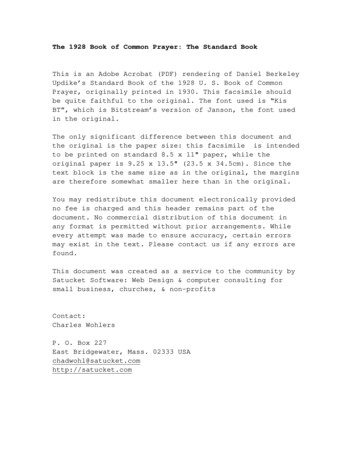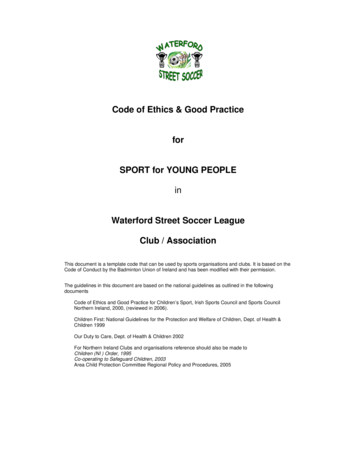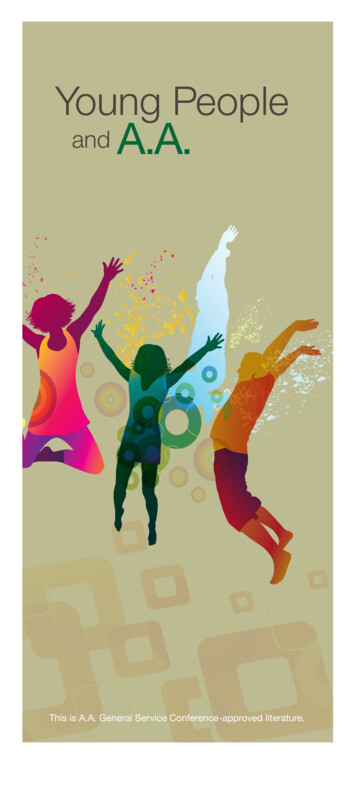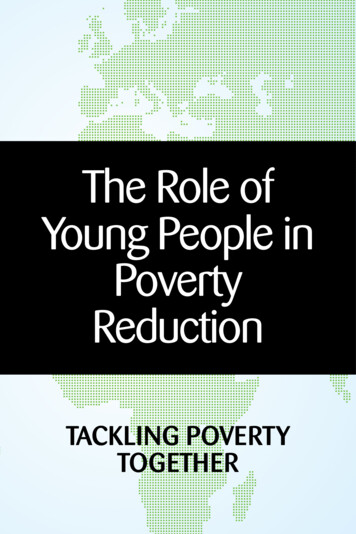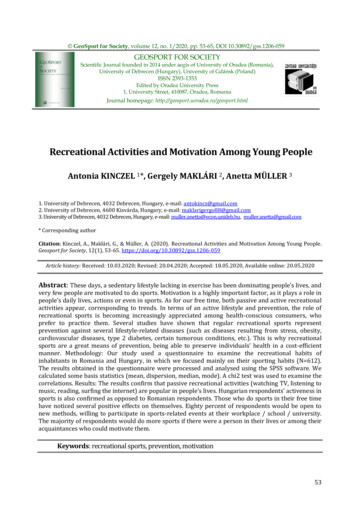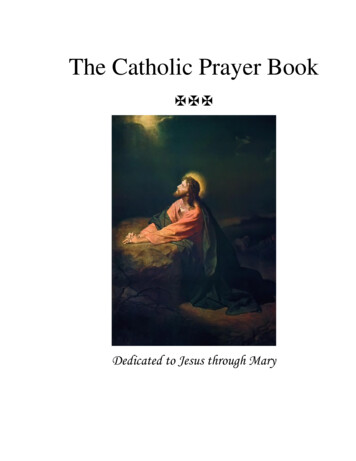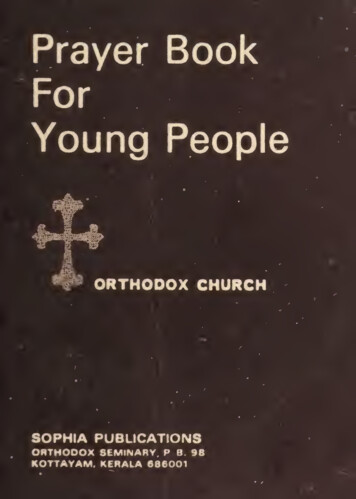
Transcription
Prayer BookForYoung People j1‘I. ORTHODOX CHURCHSOPHIA PUBLICATIONSORTHOOOX SEMINARY. P 8 98KOTTAYAM. KERALA 686001:
»v.;»n.;'v;vo? —ll \.V ix Uibrisutmtbo Htbrarp rge Anton Kiraz CollectionsKAoAO{OOOloouCOOCnlVi1 PlX .1.Ol*A-A.Ci srty Lu('Ao,J r*.,.nmO SO) XCOLiO "AaolL. OOJOoAKA.null. ks for this volume, tocopy from it, and who) himself or herself, orit of it, should realize'e to give answer beforetribunal as if (s)he hadry. Let such a person bed receive no forgivenessis returned. So be it, ne who removes theselly or otherwise, shalliem in double.
PRAYER BOOKFORYOUNG PEOPLEORTHODOX CHURCHSOPHIA PUBLICATIONSOrthodox Seminary, P. B. 98Kottayam, Kerala 686001
FOREWORDThis second, enlarged, edition of thePrayer Book for Young People, is beingoffered in response to a wide demand. Thefirst edition was quickly sold out. So manyof our young people outside Kerala do notknow Malayalam and need a prayer book inEnglish. We hope we will soon be able tobring out similar prayer books in Hindi andother languages.In the Orthodox tradition, there are nocanonical family or private prayers. Allthe prayers of the Church are meant forcongregational worship or for use in monas teries. As far as I know, there is no Churchlaw that requires laymen to pray seven timesa day, or to say all the qaumas of prayer.The present book of prayers is a fairly arbi trary selection for personal and group use.
I would welcome critical comments. Thosewho would object to the different forms olthe Lord’s Prayer are requested to let meknow which form they prefer. T.te differenttranslations of the Lord’s Prayer have eachits own merit.Some of the additional prayers are meantfor private meditation, or for use in meet ings and conferences.May God help us all to grow in prayerand thus grow closer to Him.DelhiGreat Lent 1978Paulos Mar GregoriosMetropolitan of Delhi
WHAT IS PRAYER? WHY PRAY?HOW PRAY?1.What is Prayer ?Prayeris like breathing.Withoutbreathing we cannot live. Whenwebreathe, air enters our lungs, cleansesthe blood in our veins by relieving it ofthe carbon-dioxide, and supplying it withoxygen. If I do not breathe for a fewminutes I die. When I have hard phy sical work to do, I need more air thanwhen I am sleeping or sitting in a chair.Fortunately God has so ordained thatwe do not die spiritually just because wehave failed to pray for sometime.Butwhere there is no prayer sin accumulatesand the proper functioning of the spiri tual life becomes obstructed. And if youhave important spiritual work to do youneed more prayer than otherwise. Only
11those who pray constantly are exercisingtheir spiritual muscles.Prayer is communion or communicationwith God —opening ourselves to Him andreceiving His love. It is by living cons ciously in this relationship of love thatwe can be transformed into the image ofGod. By prayer we become more likeGod, more loving, more wise, morepowerful, more kind and good.In prayer we are cleansed of the accu mulated impurities of our life and we aresupplied with power to live a good, kindand holy life.Prayer is not a matter of asking Godfor all kinds of things. Some teen-agersspeak to their earthly father only whenthey need money. We should not becomelike them in relation to our heavenlyFather—going to Him only when weneedsomething.The relationship isvaluable in itself, as in all true love. It isnot what we get out of it that matters,
Illbut the fact that we are in communion withour loving Heavenly Father.2.Why Pray?Does not God know what we need, evenbefore we ask him? Why does He want usto ask? Does prayer change God’s will inany way? Can my prayer change the futurethat God has already determined?These are legitimate questions that needto be answered. The Bible says clearly “yourFather knows what you need before youask Him” (St. Mathew 6:8).But Godwants that we know what is good for othersas well as for ourselves. God wants that ourwill should not incline towards evil, butdesire the good with deep yearning. Prayeris therefore a way of training the will todesire the good, as well as of turning ourwills towards the highest concentration ofall good, namely God.Prayer is thus a way of becoming good byusing our freedom to turn towards the good
IVand to will the good. By prayer we becomelike God. God is good and wills the good.We should also become like God in willingand desiring what is good. By communionwith God we also learn to desire the goodwhich God also desires.God said: “Let there be light” and therewas light. And God saw that the light wasgood (Gen. 1:3-4).What God willedbecame reality. We are to become likeGod. So we must also acquire the capacityto will the good, and it will happen as wedesire, when we become more and morelike God. Prayer is an expression of our willin desiring the good and realising it. Whenwe are delivered from selfishness, pride, andevil desires, our prayers will become morelike the creative Word of God, which merelyby saying “let there be light” can createlight.God has made us partakers of His owndivine nature. He has called us to share inGod’s own glory and excellence (2 Pet. 1:4).When we trust in God and live a life of
Vdiscipline, prayer, worship, virtue, know ledge, godliness, brotherly affection andlove (2 Pet. 1:5-8), we are transformed intoGod’s likeness and share in His divinepower. God wants us to have a part in thetask of shaping this world through prayerand knowledge and work.By prayer we do change reality. God hasgiven us that power. But this power is notavailable to us until we become more god like. That is why the prayers of the saintsare more effective than our own prayer—because they are more god-like than we are.If the power to change the world by ourwill is in the hands of evil men, they willmake the world evil. We have to grow inthe capacity for prayer by developing thehabits of prayer and loving service.And our prayers should not be selfish. Inprayer the first focus is God. The secondfocus is other people. Only in the thirdplace should we ask things for ourselves.In the Lord’s Prayer all the first petitionsare focused on God—His name, His king-
VIdom, His will. This is the way our prayershould also be. We pray that God’s pur poses may be established in the lives of allpeople, that evil may be banished from theearth, that all men may live together inpeace and justice, praising God the centreand source of all good. Even in the prayersthat ask for daily food, for forgiveness andfor protection from evil, the first personsingular (I, me) is not used in the Lord’sPrayer. We ask things for us, for all men.When we all pray with love and faith,without selfishness or pride, our prayerchanges things. God has more laws thanthe laws of physical science. He can makeprayer achieve ‘miracles’ of healing andtransformation which cannot be explainedby medical science. Our science knowsonly some of God's laws. Prayer is alsosubject to certain laws. It is the same powerof God which operates in the scientific realmand in the realm of prayer.In prayer, we are never alone. Not evenalone with God. Especially in group prayer,
Vllwe coirmemorate all those who are mem bers of the Body of Christ, for it is as amember of the Body that we pray, and theother menbers are always with us. This iswhy we commemorate the Prophets, Apos tles, the Elessed Virgin Mary, the Martyrs,the Saints, the great Teachers and all thefaithful departed and all the faithful living.3.How Prav ?Prayer has to be learned. It is like swim ming. Whenyou are first thrown into thewater, you imy sink. You then may thinkthat the law of gravity is final and cannotbe changed. But there are other laws, likethose of buoymcy and motion. The mereknowledge of these laws cannot teach youto swim. On; jumps in and slowly, byrepeated pracice, acquires the skills of re maining afloatand of moving on the surfaceof or under tbs water. And some peopleare more skiful swimmers than others,because they lave learned the rules andacquired the skills by constant practice.
VlllThe first rule in prayer as in swimming, isnot to give up just because you do not succeedin the first three or four attempts. Prayer isa spiritual skill to be acquired by constantpractice.The second rule, again as in swimming, isto “/ ?/ go”, to let the water support you, tobe unanxious and relaxed. In prayer alsowe have to let ourselves go, re’ax, trust inGod to support you and teach you how topray.The third rule is to keep w the practice,even if you do not feel like it, o; enjoy it. Inthe life of prayer, our inheren; love of sen sual pleasures and our selfish bve of lazinessand comfort, will interefere tomake us relu ctant to keep up the practice finding vari ous excuses for not praying. There is nouse saying “I don’t feel lik; praying” or“1 do not get anything from i”. It will takeyears before you get the habi’of prayer andreally begin to enjoy it. One must streng then the will to have contro over the lazi ness of the body and the desies of the flesh
IXif one is to make progress in the art andskill of prayer. There is nothing like regularpractice which can teach you to pray.A fourth rule, closely connected with thethird, is : develop the discipline of prayerthrough fasting and self-control. Man doesnot become free and good like God until helearns to control his own inner drives andpassions. Restraint of hunger and thirst,of anger and jealousy, of sexual passion, ofthe desire for glory and flattery, of thedesire for bodily excitement and for sensualstimulation, and of all inner turbulenceswhich make us do things against our owntree will, is a necessary preparation forprayer. As good athletes competing for theOlympic Games go through very rigorousself-discipline in order to keep their body,muscles and nerves in good condition, soshould the man of prayer keep his body,mind, and spirit in good condition and underconscious control.A fifth rule is to use our whole body andeven material things in the service of prayer.
XPrayer is an act of the whole man, body,soul and spirit—not simply an act of themind. The body can participate in prayerthrough posture, speech, and acts:(a) Posture In our Eastern tradition, theposture for prayer is standing, facingeast, with arms uplifted or folded inadoration and worship.(b) Focus It is good to have a focal pointoutside—a cross with two candles on eachside, icons or pictures of Christ, of theBlessed Virgin Mother and of the Saints,or even a more elaborate prayer-altarfixed in some part of the house, wherethe whole family assembles for prayer.Crucifixes, i.e. crosses with the represen tation of the crucified body of Christ onit, belong to the Western tradition, andare not to be encouraged in our tradi tion. In choosing pictures, it is best touse Eastern icons. Pictures with thesacred heart of Christ or of the VirginMother are to be avoided, because thesebelong to a particular period in Latin
XIpiety and are not helpful for a balancedspirituality.(c) Lips and Mouth The body must pray—not merely the mind. Let your lips andmouth sing the praises of God, even ifyour mind does not always follow. Theact of the lips and mouth is also your actof prayer, even without the concentra tion. Singing is better than saying yourprayers, for in the very music certainhuman attitudes and aspirations areexpressed.(d) Wandering of the mind Do not getanxious about the wandering of yourmind. When you become aware thatyour mind is wandering, bring it backby consciously offering your wanderingmind also to God. It is part of our con fession about ourselves. “This is what Iam Lord, distracted and unable to con centrate. I offer myself to Thee as I am.Take my wandering and distracted mind,and heal it by Thy grace.” God willforgive you and transform you gradually.
Xll(e) Gestures Use the gestures of prostration,bowing the head, making the sign of thecross, and giving the kiss of peace.Words are not the only means of expres sion we have. Folding the hands andbowing is a sign of adoration, and ofwaiting for a blessing. Lifting up yourhands with palms open, can mean peti tion, penitence, and intercession. Pros tration is like Sashtangapranama, thesign of complete surrender and submis sion, placing yourselves in the hands ofGod with full trust. Making the sign ofthe cross is a way of reminding ourselvesthat we have been saved by the Crossof Christ, in fact crucified with Christ.Keepyour threefingerstogether(thumb, index and middle fingers) totouch the forehead (symbolizing theTrinity, the source of all life and all good)and make a descending motion to thelower side of your chest to signify thedescent of the Son of God from heavento earth for our salvation, then takeyourfingers from your leftarmto your right arm signifying both
Xlllthe horizontal arm of the cross, andthe fact that we who were on the left aschildren of darkness, have now beenbrought to the right side of God aschildren of light. Giving the kiss ofpeace is the symbol of mutual forgive ness and love, and it is a time for us toovercome all feelings of bitterness oranger against members of the family orothers outside.All these signs are part of a languagewhich goes much deeper than words andtransforms our sub-conscious minds whichwords can seldom reach.A sixth rule is to keep the balance bet ween group prayer and personal prayer. Manis not primarily an individual. It is as amember of the Body of Christ that he hasany standing before God. Therefore it isimportant for us to come into the presenceof God regularly as a community—as afamily, as a youth group, as a local congrega tion. And a community is composed ofall kinds of people, not all of them exactly
XIVlike you. They have different tastes, differ ent ways of praying, different habits ofprayer. I have to join them even some times when I think that their way of wor ship is not what it should be. Without parti cipating in community worship and makingthe necessary adjustments necessary forjoining them, we cann
Prayer Book for Young People, is being offered in response to a wide demand. The first edition was quickly sold out. So many of our young people outside Kerala do not know Malayalam and need a prayer book in English. We hope we will soon be able to bring out similar prayer books in Hindi and other languages. In the Orthodox tradition, there are no canonical family or private prayers. All the .
